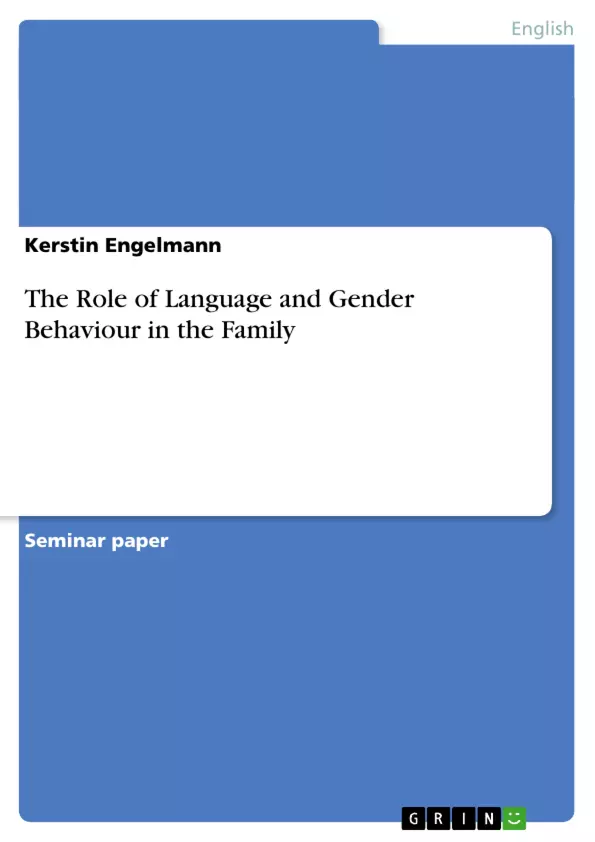“Parents play an active teaching role that is “…commonplace, conscious, and directive.”
For this reason, I decided to consider the role of language and gender behaviour in the family. In this paper, I demonstrate similarities and differences of language and behaviour of parents towards their children. First, I focus on general language and behaviour of parents. Opening, I show how they talk to their children regardless which sex they have. Further, I look at variations of speech to female and male children. Secondly, I concentrate on aspects of fathers language and behaviour towards their children by showing similarities and differences. Third, I give attention to mothers. I consider both general speech towards children without regard to their gender and differentiation between male and female children. To conclude, I demonstrate how children react to their parents. I consider if they have a gender-typed speech towards their parents.
Inhaltsverzeichnis (Table of Contents)
- Introduction
- Main Part
- General aspects of parents' language and behaviour towards their children
- Parents' language towards children without relation to gender
- Parents' language and behaviour differentiation towards male and female children
- Aspects of fathers' language and behaviour towards their children
- General language of fathers towards children
- Fathers' language and behaviour differentiation towards male and female children
- Aspects of mothers' language and behaviour towards their children
- General language of mothers towards children
- Mothers' language and behaviour differentiation towards male and female children
- General aspects of parents' language and behaviour towards their children
- Conclusion: How children react and talk to their parents
Zielsetzung und Themenschwerpunkte (Objectives and Key Themes)
This paper investigates the role of language and gender behaviour in the family, exploring the similarities and differences in the way parents communicate with their children. The paper focuses on both general language and behaviour patterns and specific variations in speech directed towards male and female children. The main themes explored include:- The influence of parents' language and behaviour on children's speech development
- Variations in language used by parents towards children of different genders
- The impact of parental communication on children's social and emotional development
- The role of parents in fostering communication skills and turn-taking in children
- The complexities of studying mothers' language and behaviour towards children.
Zusammenfassung der Kapitel (Chapter Summaries)
- The first chapter examines general aspects of parental language and behaviour towards children. It highlights the use of similar language structures by parents, despite variations in language directed towards individual children. The chapter emphasizes the importance of parents' language input in shaping children's early language development and the development of turn-taking abilities.
- The second chapter focuses on fathers' language and behaviour towards children. It discusses the similarities and differences in fathers' language and behaviour towards male and female children, recognizing the influence of fathers' communication on children's social and emotional development.
- The third chapter explores the language and behaviour of mothers towards their children. It examines the complexities of studying mothers' communication patterns and the challenges of finding research on this topic. The chapter highlights the importance of understanding the role of mothers in children's development.
Schlüsselwörter (Keywords)
This paper explores the crucial role of language and gender behaviour in the family, examining the influence of parents' communication on children's speech development, social and emotional development, and turn-taking abilities. The paper focuses on the specific variations in language directed towards male and female children and the challenges of studying mothers' language and behaviour towards their children. Key concepts include parental communication, gender differences in language, child development, and turn-taking.Frequently Asked Questions
How do parents influence a child's language development?
Parents play an active, conscious, and directive role in teaching language, providing the primary input that shapes early speech and communication skills.
Are there differences in how parents speak to sons versus daughters?
Yes, research indicates variations in parental speech and behavior based on the child's gender, which can impact their social and emotional development.
What is the specific role of fathers in family communication?
Fathers contribute uniquely to children's social development through their specific language patterns and interactions, which may differ between male and female children.
Why is studying mothers' language behavior considered complex?
It involves analyzing both general speech patterns and gender-specific differentiations, often facing a lack of comprehensive comparative research in certain areas.
How do children react to their parents' communication styles?
Children often develop gender-typed speech patterns themselves as a reaction to the linguistic input and behavioral expectations within the family.
- Quote paper
- Kerstin Engelmann (Author), 2005, The Role of Language and Gender Behaviour in the Family, Munich, GRIN Verlag, https://www.grin.com/document/128002



